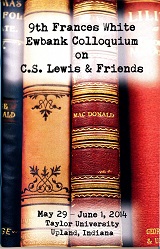Event Title
Paper Session 4-B
Location
Euler 108
Start Date
31-5-2014 10:15 AM
Description
"Merging C.S. Lewis and G.K. Chesterton: God as the Unarticulated Constituent in Mere Christianity and Orthodoxy" - Finney Premkumar
G.K. Chesterton once stated "God is like the sun, you cannot look at it but without it you cannot look at anything else." Echoing similar sentiments C.S. Lewis declared, "I believe in Christianity as I believe that the sun has risen: not only because I see it, but because by it I see everything else." God, according to them, is in many ways the inexplicit or unarticulated constituent from whom the more comprehensive or coherent aspects of life emerge. This paper will be a study in the common theoretical themes resident in two seminal works, Orthodoxy and Mere Christianity, authored by Chesterton and Lewis respectively. The first section will explore the idea of God as an unarticulated constituent of thought and experience in the reflection of the aforementioned thinkers. The second section will undertake to show how this unarticulated constituent becomes more explicit and articulated in the inevitable exemplification of uniquely moral grammar in conversations. I will conclude by arguing that this method of correlation between the unarticulated and the articulated or the tacit and the explicit dimension inevitably provides a very compelling contemporary apologetic approach.
"If a Thing's Worth Doing, It's Worth Doing Badly: A Chestertonian Perspective on Work" - Robert Moore-Jumonville
Event Type
Paper
Paper Session 4-B
Euler 108
"Merging C.S. Lewis and G.K. Chesterton: God as the Unarticulated Constituent in Mere Christianity and Orthodoxy" - Finney Premkumar
G.K. Chesterton once stated "God is like the sun, you cannot look at it but without it you cannot look at anything else." Echoing similar sentiments C.S. Lewis declared, "I believe in Christianity as I believe that the sun has risen: not only because I see it, but because by it I see everything else." God, according to them, is in many ways the inexplicit or unarticulated constituent from whom the more comprehensive or coherent aspects of life emerge. This paper will be a study in the common theoretical themes resident in two seminal works, Orthodoxy and Mere Christianity, authored by Chesterton and Lewis respectively. The first section will explore the idea of God as an unarticulated constituent of thought and experience in the reflection of the aforementioned thinkers. The second section will undertake to show how this unarticulated constituent becomes more explicit and articulated in the inevitable exemplification of uniquely moral grammar in conversations. I will conclude by arguing that this method of correlation between the unarticulated and the articulated or the tacit and the explicit dimension inevitably provides a very compelling contemporary apologetic approach.
"If a Thing's Worth Doing, It's Worth Doing Badly: A Chestertonian Perspective on Work" - Robert Moore-Jumonville


